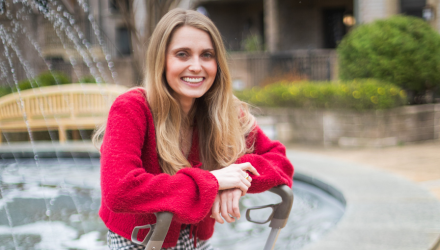Name: Natalie Rex
Age: 31
Where do you call home? Washington, DC
What is your education? How will FA add to your future? Bachelor’s degree in Human and Organizational Development from Vanderbilt. I work as a Program Manager at Google, and would love to eventually focus on accessibility and disability awareness (a perspective FA has given me)
Who do you live with? My fraternal twin sister (and bestie!)
What’s a typical day for you? I make an awesome cup of coffee and do some morning reading. Then, I either work from home or walk (about 20 minutes) to my office, working as a Program Manager at Google. After work, I’ll either work out at a gym or go for a long walk, meet up with a friend for dinner, or host a Bible study in my living room. Each week is a bit different, though!
How long have you known you are living with FA? When and how were you diagnosed? I was diagnosed at 22, a few days before college graduation, after having strange balance and coordination issues. They weren’t able to figure out a diagnosis at the student health center, so they referred me to a neurologist at Vanderbilt hospital. He had seen FA before, so my entire diagnostic timeline was relatively short (five months).
Are there any others with FA in your family? Just me!
Describe an adaptation and/or transition you have had to take due to living with FA. About 6.5 years into my diagnosis, I used a cane briefly. The initial transition was so tough and felt very emotionally overwhelming. Then, beginning to use a walker was when the true deep emotions came out. My walker provides me incredible independence, and I’ve become more accustomed to it. However, switching to using assistance felt like I was giving into my progression – as though I was truly grasping that my body wouldn’t be able to do what it used to.
What do you like to do to stay active and what type of exercises work for you to stay strong? I’ve dabbled in rowing class, walk a lot, try to do personal training two times a month, and use my stationary bike at home.
Do you have any hobbies or special interests? I love watching live music and improv comedy, going for walks with friends, and hosting parties.
What is a good trick to make daily life easier? Wearing shoes around the house! If I go barefoot, my feet don’t get any input and will go numb. So I always have something (slippers, sneakers) on my feet.
When FA gets you down, what do you think/do to feel better? I usually remind myself that we don’t choose our lives (particularly if I’m feeling embarrassed or standing out due to my walker), but I do choose how I respond and my attitude toward it. And to truly take it one day at a time.
What is one way living with FA has POSITIVELY affected your life? FA has given me the chance to meet so many new people and share my story in ways I couldn’t have imagined. I’ve gotten to go deep with people in the tension of life being really good and really hard with my lived experience of FA changing what I thought my life would look like.
What is a favorite motivational quote of yours? “We’re disrupting the myth that joy can only be found through a pain-free life.” – Katherine and Jay Wolf, Hope Heals
What is a piece of advice that someone with FA has given you that encourages and inspires you? Don’t get too ahead of things, and just live your life. You’ll figure out how to adjust when you need to.
What is the best advice YOU could give to a person who has been newly diagnosed with FA? Try not to think about what you can’t do, and instead do things until you have to shake it up and adapt them. For instance, I stopped going to workout classes because it felt like I couldn’t keep up/do the exercises, and missed that environment and experience. Finding rowing and adventuring into trying a new form of exercise has let me do things I once withdrew from.
What is the first thing you want to do when a cure/treatment to FA is found? Ride a two-wheel bike everywhere! I love to bike, but don’t have many accessible options for biking in DC. Or basically just be excited that I don’t have to worry about falling.
“I have FA but FA doesn’t have me.” What does this statement mean to you? FA isn’t the whole part of my story – it’s a big part, but doesn’t have to dictate everything I do. It can be part of how I think through things and what is important to me, but doesn’t have to limit me as much as I thought so in the past.
How do you live your life in the face of adversity? Faith is huge for me. It’s so easy to get discouraged and feel hopeless in the face of something that gets progressively worse. Yet, having a strong community and family that supports me in the hard, and deep faith and trust in the Lord’s plan for my life helps when I don’t always understand things.
Tell us a little more about you…. I’m super passionate about creating and advocating for inclusive spaces, particularly in the church. If you ever want to talk about disability awareness, let me know!
Interview by
Noah Griffin
